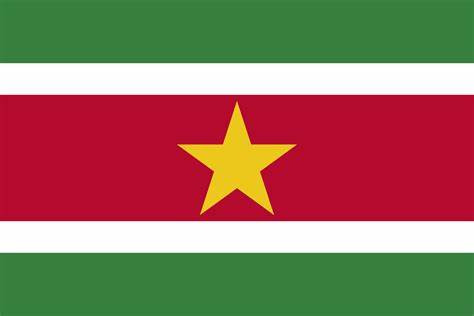Suriname
Knowledge Base
Frequently asked question, important data and information on EOR.

General information
$ 20.00 SRD per hour
Labor Law
Laws that regulate Labor Relationship
• Labour Code Act
• Civil Code
• The Collective Bargaining Agreements Act
• Dismissal Permits Act
• The Holidays Act
Onboarding guide
- Contract requirements
- Types of contracts
- Probation Period
- Offer letter
- Digital signature
- Onboarding documents
Requirements for a labor contract
• Employer’s name
• Employer’s city
• Employer’s address
• Employee’s name
• Employee’s place of birth
• Employee’s city
• Employee’s address
• Start date
• Sign date
• Contract duration
• End date (for fixed contracts)
• Job position
• Employee’s work city
• Employee’s address
• Monthly salary
• Company’s name
• Director’s name
• Director’s position
Pre-hire Medical exam
No
Types of contracts
• Indefinite
• Fixed-term
Probation Period
Probationary periods can be stipulated at the beginning of an employment or for a new position. Should have a maximum duration of 2 months. Probationary periods however are not obligatory.
Are offer letters mandatory in the country?
Not mandatory
Are digital signatures in labor contracts valid?
Permitted.
Mandatory onboarding documents
• Resume
• National Extract
• Birth Certificate
• Police Clearance
• Identification Card Copy
• Passport’s Copy
• Diploma and certificates copy
• Work permit (if needed)
• Residence Permit (if needed)
• Insurance form
• Bank information
Statutory benefits
Annual Bonus
Suriname has no other mandatory legislation. The employer may therefore agree on other benefits in consultation with the employee.
Additional bonus
Employers must pay a vacation allowance that equals to 50% wages in addition to the employee normal salary.
Leaves (medical, maternity, paternity, etc.)
Maternity leave: employed women will be entitled to paid maternity leave for 16 weeks. Women who give birth to multiple births, i.e. three or more children, are entitled to maternity leave up to a maximum of 24 weeks.
Paternity leave: employed women will be entitled to paid paternity leave for 7 days
Annual Leave (days per year)
The minimum length of the holiday is for one uninterrupted calendar year of service, 12 days for the first year and an additional 2 days for the subsequent 3 years up to a minimum of 18 days after the fourth year.
In the event of service less than one calendar year in the first year of service the employee is entitled to one day for every full month of service.
How do vacation days expire?
The holiday allowance is set by law. It is calculated on the basis of a formula: the holiday allowance is equal to 50% x number of vacation days x daily wage of the employee.
The employees must take their vacation days as much as possible within the service year.
The employee is obliged to have taken the holidays, otherwise, they will lapse.
Official Holidays
• 1 Jan, New Year’s Day
• 25 Jan, Chinese New Year
• 25 Feb, Day of Liberation and Innovation
• 9 Mar, Holi
• 10 Apr, Good Friday
• 12 Apr, Easter Sunday
• 1 May, Labour Day
• 1 Jul, Eid al-Fitr Keti Koti
• 9 Aug, Eid al-Adha Indigenous People’s Day
• 10 Oct, Maroons Day
• 25 Nov, Diwali Republic Day of Suriname
• 25 Dec, Christmas Day
Working on holidays and Sundays
Paid at 100% extra on top of the regular wage
Number of Working hours
8.5 hours per day, 45 hours a week
Overtime
Paid at 50% extra on top of the regular wage during day hours and 100% for night work hours
Social Security (what does it cover)
• Old-Age Benefits
• Permanent Disability Benefits
• Survivor Benefits
• Sickness and Maternity Benefits
• Workers’ Medical Benefits
• Dependents’ Medical Benefits
• Temporary Disability Benefits
• Permanent Disability Benefits
• Family Allowance Benefits
Payroll
Salary payment currency
Suriname Dollar (SRD)
Can salary be paid in a different currency other than the local currency?
Yes.
Payment frequency
• Monthly
VAT percentage
10%
Income Tax
Taxable income is taxed at the following progressive rates on an annual basis:
Taxable income in SRD Applicable wage tax rates
• 0 up to and including 2646 0%
• Above 2646 and up to and including 14002.80 8%
• Above 14002.80 and up to and including 21919.80 18%
• Above 21919.80 and up to and including 32839.80 28%
• Above 32839.80 38%
Tax Payer Identification Number
Tax Payer Registration Number – (TRN)
Offboarding
Voluntary resignation
For the worker are conditions, which make it unreasonable for him to continue the relationship (Article 1615 q). Some grounds stated in the Civil Code are those related to:
• assault by the employer or his family members;
• threats to the worker or family members;
• late payment of wages/salaries;
• non-performance of the employer regarding board and lodging, if such is stipulated;
• insufficient amount of work or assistance to the worker, if such is stipulated;
• neglecting of duties;
• orders from the employer to perform duties for another employer without reasons;
• safety for life, health, morals and honour;
• sickness.
Contract termination
Contracts can be terminated in the following manner:
• Notice for termination of a contract for a fixed term is only required when such is stipulated (first contract) or in case of a continued employment contract or a contract considered to be continued (Article 1615 e and f). In order to give notice, the employer applies for a dismissal permit
• Termination without notice and with compensation for termination other than for urgent grounds/ serious misconduct (Article 1615 of paragraph 1);
• Death of the worker (Article 1615 j); Death of the employer results in termination of the employment contract only if this is stipulated (1615 k);
• Instant dismissal on urgent grounds (i.e. for good and sufficient cause/serious misconduct – Article1615 p) without notice or compensation. Employers should in this case immediately dismiss the employee and notify the Labour Inspectorate within 4 days for its approval or objection (Dismissal Permits Act). The Civil Code lists some reasons for instant dismissal for employers and workers (Articles 1615 p and q).
Justified Dismissal
In general such acts, or conduct of the employee, which makes it unreasonable to require the employer to continue the employment relationship. Some examples stated in the Civil Code (Article 1615 p) are related to:
• misleading of the employer by supplying false information or submitting false or forged documents to influence his/her entering into employment;
• serious lack of skills and competencies of the worker;
• drunkenness or other misbehavior of the worker;
• theft, embezzlement, fraud or other criminal offenses of the worker affecting the trust of the employer;
• offences of the worker effecting the trust of the employer;
• assault, gross insult or threat of the employer, his family or colleagues;
• threats to the employer, his family members or colleagues;
• vandalizing the employer’s property;
• breach of confidentiality by the worker;
• refusal to do a particular job by the worker;
• negligence by the worker in relations to his duties; and
• the impossibility of the worker to perform duties due to his own acts.
Unjustified Dismissal
• According to the Dismissal Permits Act it is not allowed for an employer to terminate the employment relationship without the dismissal permit. This prohibition does not apply in cases of termination by mutual consent; termination ipso jure; termination on urgent grounds (serious misconduct); and termination during probationary period.
• When notice of dismissal is given without a permit, complaints lodged at the Labour Inspectorate will ultimately lead to application for the permit and perhaps lawful dismissal. On the other hand, the worker could bring a claim before the Court of Justice for damages against the employer for nonobservance of the prescribed notice period.
• Termination of the employment relationship without notification to the Labour Inspectorate (Inspector-General) in case of urgent reasons or without dismissal permit in other cases constitutes an offence against the Dismissal Permits Act. Penal sanctions (fine or imprisonment) are applicable in such cases.
The 1859 civil code requires employers to provide a severance pay equal to:
• four weeks of the employee’s wages for four or fewer years of service;
• one week of wages for each year of service for five to nine years of service;
• four months of wages for 10 to 15 years of service;
• six months of wages for more than 15 years of service.
Minimum Notice Period
The notice period is related to the years of service of the employee at the time of termination and may extend up to 6 months for the employer and a maximum 3 month notice period applies for the employee giving notice.
Immigration
Visa process
The requirements for Visa are: A MKV needs to be applied first in the country of residence. A MKV (short stay permit)can be requested for a minimum of 91 days and a maximum of 2 (two) years; a request for extension must be submitted in person in Suriname 3 (three) months before the current residence permit expires.
With an approved MKV, the applicant receives a KV visa from the Embassy or Consulate of Suriname in the country of origin. An MKV application can be submitted at one of the Diplomatic or Consular missions of Suriname in the country of residence or in the region. Please note that with a business visa we cannot apply for a work permit.
For a work permit you will need a MKV. The MKV will have to be applied first in order to obtain a work permit. An MKV application should be submitted at one of the Diplomatic or Consular missions of Suriname in the country of residence or in the region.
Visa documents
If you are applying for the Authorization for Short stay (MKV) for labor purposes, The following documents for Short Stay Visa are needed:
• Passport cover page
• Passport bio page
• Scan of written or stamped pages of last 3 visits
• Birth certificate (with legalization)
• Certificate of “good conduct” (from the Police department, with legalization).
• Recent Medical Report or Health certificate (not older than 3 months)
• Valid travel insurance/health insurance (you need to submit this document after the MKV has been approved).
• Employment invitation letter (English)
• Reference letter (new employer)
• ID Card (referent)
• Company’s resume from Chamber of Commerce
• Business license
• Copies of diplomas and certificates + Legalized (Dutch/English)
• Reference letter (previous employer)
• Job description and requirements
• Curriculum Vitae
• If married/divorced/living together/single/widow, Marriage certificate/divorce papers or partnership contract etc. (with legalization)
Discover where you can grow with Serviap Global
Contact us and start your business expansion today





